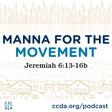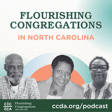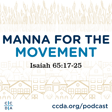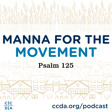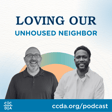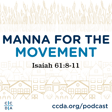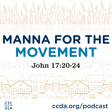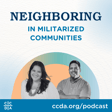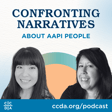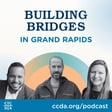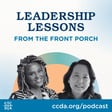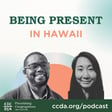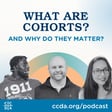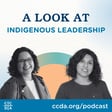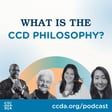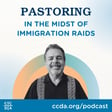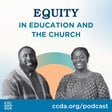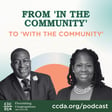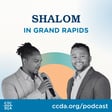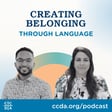Introduction to CCDA and Locked in Solidarity Week
00:00:09
Speaker
Hello and welcome to the CCDA podcast.
00:00:12
Speaker
My name is Christina For and I am the Director of Engagement and Mobilization here at CCDA and I am your host for this episode.
00:00:19
Speaker
This week is Locked in Solidarity, which is CCDA's annual and national awareness and action week on mass incarceration.
00:00:27
Speaker
And this week we are sharing resources and hosting events to help you and your community interrupt a violence.
Concerts and Documentary with Our Daily Bread and Lecrae
00:00:33
Speaker
And so you can learn more about that at ccda.org slash LIS.
00:00:38
Speaker
Today, we're joined by some incredible guests to talk about a powerful project CCDA partnered with with Our Daily Bread, Win With Justice, Tadashi, and Lecrae.
00:00:49
Speaker
And this past January, we had the opportunity to take this team into two maximum security prisons.
Bo and Maya's Background in Prison Ministry
00:00:56
Speaker
Jefferson City Correctional Center and Algoa, where we put on concerts to encourage those behind bars and filmed a documentary capturing Jonathan Irons' return to the place where he was incarcerated for 23 years.
00:01:09
Speaker
But I won't give away too much because we're going to dive in and hear more from our guests.
00:01:15
Speaker
So can we all share a little bit about who you are?
00:01:17
Speaker
And we can start with my friend Bo from Our Daily Bread.
00:01:23
Speaker
My name is Beau Cornelius.
00:01:25
Speaker
I'm director of prison ministry for Our Daily Bread.
00:01:29
Speaker
I'm also executive director of a nonprofit that I started with me and my wife in the Kansas City area called Second Mountain.
00:01:38
Speaker
We work at the grassroots level in prisons, implementing a
00:01:43
Speaker
leadership development program.
00:01:45
Speaker
We also are starting housing as well as supporting peer support certifications for people coming out of prison.
00:01:55
Speaker
I'm formerly incarcerated.
00:01:56
Speaker
I was released from prison about 20 months ago.
00:02:00
Speaker
So happy to be here and
Maya's Advocacy Against Mass Incarceration
00:02:03
Speaker
be part of this awesome project.
00:02:07
Speaker
My name is Maya Moore Irons, wife of Jonathan Irons.
00:02:12
Speaker
I am probably most known for my hooping part of my life.
00:02:19
Speaker
I've played professional basketball for a long time, got connected with prison ministry through my extended family.
00:02:30
Speaker
when I was in high school and had the privilege of walking alongside Jonathan while he was fighting his wrongful incarceration for over 23 and a half years.
00:02:47
Speaker
And so I really come in with a perspective of
00:02:52
Speaker
being completely ignorant to mass incarceration, to getting proximate to mass incarceration, then to becoming very passionate about advocating and ending it, as well as just really trying to be a voice for
00:03:11
Speaker
human dignity for all because so many of our problems I think stem from us not seeing each other all as image bearers and so I'm a mom like I mentioned I'm married to Jonathan as well so we have a just turned three year old and we are in it he is fully three and the best thing about our life so it's a little bit about me
Jonathan Irons' Story of Wrongful Conviction
00:03:43
Speaker
Christina, I'm Jonathan Irons.
00:03:45
Speaker
I am a survivor of being wrongfully convicted.
00:03:48
Speaker
I spent over 23 and a half years in prison for a crime I didn't commit, and I got exonerated in 2020.
00:03:53
Speaker
And I've been home since July 1st of 2020.
00:03:58
Speaker
I'm married to Maya, which is, she's such a great and beautiful and amazing person, I'll say that.
00:04:05
Speaker
And JJ has a good mama.
00:04:07
Speaker
He's in good hands.
00:04:12
Speaker
I am an entrepreneur, dog trainer, and I am for showing people what goes on in prison, what works and what doesn't work.
00:04:25
Speaker
I have over 23 and a half years of experience
00:04:28
Speaker
And I have a unique set of skills for that.
00:04:32
Speaker
And I want to share that and expose that and show people who people are inside because there's a tendency, which makes it easier, I think.
00:04:40
Speaker
There's a tendency to just dehumanize people and forget about them.
00:04:44
Speaker
They don't matter.
00:04:45
Speaker
They're less than human.
00:04:46
Speaker
In actuality, that's bad.
00:04:47
Speaker
That's bad for our society.
00:04:49
Speaker
That's bad for them.
00:04:50
Speaker
And that's bad for people moving forward.
00:04:52
Speaker
And I guess we're moving together as a society.
00:04:55
Speaker
I believe that we need to be more tuned in to what's going on with the people that are most vulnerable.
Vision for Concert and Documentary
00:05:00
Speaker
And the people in prison are very vulnerable.
00:05:03
Speaker
I have lived among them and I've seen it.
00:05:05
Speaker
I've witnessed it.
00:05:06
Speaker
I've been on both sides.
00:05:07
Speaker
And I live as a free man and I and I and I had to go.
00:05:10
Speaker
I had to I had to go back.
00:05:12
Speaker
I had to go back and see those men and encourage them and strengthen them and let them know about, I mean, what's going on?
00:05:17
Speaker
I remember what people are thinking about them and, you know, what's in store, because that's important.
00:05:23
Speaker
They need that encouragement.
00:05:27
Speaker
And that's a good transition, Jonathan, I think, to share a little bit more kind of what was your vision originally for the concert and the documentary?
00:05:35
Speaker
And how did this kind of project come about?
00:05:39
Speaker
Well, from the beginning, I didn't know there was going to be a documentary.
00:05:42
Speaker
I just did not believe that they were going to allow cameras, you know, let alone three or four, and use inmates to do videography in JCCC.
00:05:53
Speaker
I just didn't see that.
00:05:55
Speaker
But what I had envisioned was true.
00:05:58
Speaker
I wanted to go back in and let them in, listen to some of these artists like Lecrae and Tadashi and hear what they have to say for them or say about them and just be in a room with them and fellowship with them because those guys like music like that.
00:06:15
Speaker
They never met anybody.
00:06:16
Speaker
And here's the thought.
00:06:18
Speaker
man, I can't believe someone, someone like these people coming here to perform for me.
00:06:25
Speaker
Like, man, I do matter.
00:06:29
Speaker
And like, they wanted, they didn't charge anything.
00:06:31
Speaker
They wanted to come in there and do that.
00:06:33
Speaker
And like, I, I, it was crazy as I met them and started a bond and have a relationship with them and go off and be goofy with them.
00:06:42
Speaker
You know, I, I, I light flashed in my head off of each one.
00:06:47
Speaker
I need to ask them.
00:06:48
Speaker
Like the Lord was pointing to me, showing me their heart, asking them if they would do it.
00:06:52
Speaker
And I didn't want to ask, but I did.
00:06:56
Speaker
And they said, yeah, they snatched my arm off.
00:06:58
Speaker
Like, yeah, where we go?
00:07:00
Speaker
I was like, okay, well, I don't know how to organize this thing.
00:07:03
Speaker
I don't know how to do it.
00:07:04
Speaker
I don't know how to get in JCCC.
00:07:07
Speaker
And the Lord basically put people piece by piece into the position and the vision came to life, like literally.
00:07:17
Speaker
Now, the video cameras...
00:07:20
Speaker
Or a cherry on top because not only do they get to experience it, now other people get to experience it and we can highlight like the humanity of what's going on in there and highlight things that are successful.
Emotional Impact and Systemic Change in Prisons
00:07:34
Speaker
Yeah, that's awesome.
00:07:36
Speaker
I think it was really amazing to see.
00:07:38
Speaker
I think Maya will touch on this later.
00:07:39
Speaker
Just all of the team that came together and how we all, even just the guys behind bars that we got to meet and their stories and how they contributed to this whole documentary and concert experience.
00:07:52
Speaker
What was it like to see your vision come to life and to be with these guys that you had basically grown up with?
00:08:03
Speaker
What was encouraging in that time?
00:08:05
Speaker
Well, let me just be clear.
00:08:06
Speaker
It wasn't my vision.
00:08:07
Speaker
It was the Lord's vision.
00:08:09
Speaker
And he downloaded on me.
00:08:12
Speaker
I even told my wife, I'm getting a download right now.
00:08:15
Speaker
All this is coming to me.
00:08:18
Speaker
And I didn't have the wherewithal to do that.
00:08:21
Speaker
Or even come back in that capacity.
00:08:24
Speaker
I didn't know how I could do that.
00:08:27
Speaker
But the Lord, he let me know it was possible.
00:08:30
Speaker
But just going back in there, it was...
00:08:34
Speaker
It was empowering and I needed to go back in that capacity.
00:08:39
Speaker
I needed to go in there and experience that, you know, for my healing and, you know, my journey.
00:08:47
Speaker
It was almost like a full circle moment.
00:08:52
Speaker
Like I left these men and I'm coming back.
00:08:56
Speaker
Despite all that trauma and adversity and things that I went through.
00:09:02
Speaker
And I'm going to talk about who they are as people.
00:09:06
Speaker
I was like, that's such an empowering feeling.
00:09:08
Speaker
And then also have people with me.
00:09:10
Speaker
Like I wasn't just going into prison by myself.
00:09:11
Speaker
To go up on a visit, I guess one thing.
00:09:14
Speaker
But going to prison with the whole team, like Maya was there.
00:09:17
Speaker
And just seeing some of the people that I knew and grew up in there with and played ball with.
00:09:24
Speaker
It was such a good feeling.
00:09:25
Speaker
But at the same time, my heart aches for them.
00:09:29
Speaker
Because I know what they're dealing with.
00:09:32
Speaker
And it doesn't have to be that way.
00:09:34
Speaker
And thankfully, there are people in the DOC structure, the upper structure that are ready to do it a different way because they know that's not working.
00:09:44
Speaker
And I'm encouraged by that.
00:09:45
Speaker
And I want them to be encouraged by that because it's coming.
00:09:49
Speaker
It's definitely coming.
Challenges of Re-entry for Former Inmates
00:09:50
Speaker
And so I'm so thankful.
00:09:51
Speaker
But I have a mixture of joy and pleasure and a little bit of survivor's gift because I made it and I'm living life and I'm thriving.
00:09:57
Speaker
But I knew them, I grew up with them and I can't bring them with me.
00:10:01
Speaker
Like that's a, that's a, that's a, that's a wrestle right there.
00:10:05
Speaker
Thanks for sharing.
00:10:06
Speaker
I loved a few of the pieces that you said, like that this was God's vision, which is beautiful in itself.
00:10:10
Speaker
Like God gave you this like passion and desire to see this.
00:10:15
Speaker
And then just kind of that tension between both things.
00:10:20
Speaker
It's beautiful to be able to bring people inside with you and to see the dignity and the value kind of that that whole experience brought.
00:10:29
Speaker
But that there is still pain and evil that's being done, right?
00:10:34
Speaker
And that a lot of the guys are, I think, even expressed to all of us.
00:10:38
Speaker
It kind of continues with what you're saying around what does it look like as you reenter society?
00:10:45
Speaker
What do you think people from our audience, like Christian community developers, what are the things that they should be aware of for people who return to their communities?
00:10:55
Speaker
What are some things that were helpful for you even personally?
00:10:58
Speaker
Having someone that I love and trusted to basically, in a lot of senses, hold my hand.
00:11:04
Speaker
Because that is a huge culture shock to go from being confined within a box to
00:11:11
Speaker
So just coming out and just seeing everything.
00:11:16
Speaker
I barely knew how to operate a phone.
00:11:18
Speaker
I remember my wife handed me the phone for the first time and she just said, here's your phone.
00:11:23
Speaker
I'm like, I didn't know what to do with it.
00:11:25
Speaker
I felt like a caveman.
00:11:26
Speaker
And she put her number in and called.
00:11:28
Speaker
I saw how it worked and she picked it up.
00:11:32
Speaker
To have somebody like that is important.
00:11:35
Speaker
Like people that are coming out, they need important things.
00:11:39
Speaker
They need their identification.
00:11:41
Speaker
They need somewhere to get a roof.
00:11:42
Speaker
They need a roof over their head.
00:11:44
Speaker
They need all, again, like birth certificates, social security card, some type of ID.
00:11:49
Speaker
They don't have a car most likely.
00:11:51
Speaker
They need someone to help them get around and help get these things.
00:11:54
Speaker
They need people to basically accept them
00:11:58
Speaker
and pull them into their community and be like, man, you are welcome here.
00:12:02
Speaker
Like, yeah, you know, you served your time because that's what the law says.
00:12:06
Speaker
You get your punishment and your punishment is your sentence.
00:12:09
Speaker
Like you don't go there and just continue to get dogged out.
00:12:12
Speaker
And like for the rest of your life, you'll never have an opportunity.
00:12:14
Speaker
In the real world, what would life be like if every time we did something wrong, we would always have to live with that for the rest of our lives and we never got forgiveness?
00:12:24
Speaker
There's no path to healing or change.
00:12:27
Speaker
So just having people like, like see them as people is extremely important.
00:12:32
Speaker
And then having people to speak into like who you are.
00:12:36
Speaker
Like, man, I see you.
00:12:38
Speaker
I see you strong, man.
00:12:39
Speaker
I see you strong woman.
00:12:40
Speaker
I see you striving and celebrating like the little, the little things that they do.
00:12:46
Speaker
Not the big things, but just the little things.
00:12:47
Speaker
Taking one foot, even if it's just one foot in front of the other, I see you getting up every morning.
00:12:53
Speaker
I see you washing your clothes.
00:12:54
Speaker
Man, good job, man.
00:12:56
Speaker
It's not going to be easy adjusting to come out here, but you can do it step by step, day by day.
00:13:01
Speaker
And then, you know, having the concept that,
00:13:04
Speaker
Like with many hands makes the work light.
00:13:06
Speaker
Like no one person should get in and think I can save everybody and do everything.
00:13:11
Speaker
Like, no, let's, let's recruit people and surround these people.
00:13:14
Speaker
Let's circle them because they're, they're injured.
00:13:16
Speaker
They're like out, like out in the wild, wild west.
00:13:18
Speaker
Like if you got an injured party, they would have to circle them with the wagons to make sure they're good.
00:13:23
Speaker
I guess that's what you kind of have to do with somebody like that.
00:13:27
Speaker
And try to explain the structures of life.
00:13:30
Speaker
What's marriage life like?
00:13:32
Speaker
And they need an opportunity to get counseling and actually talk about some of the things that they've been through.
00:13:38
Speaker
Uh, and, and to kind of get through that and they didn't make sure they, they start getting good habits because some of these guys are not in a position where they'll have good habits on the inside, which hopefully we're trying to create an environment to do that.
00:13:50
Speaker
But guys need people to encourage them to pick up good habits and basically
00:13:54
Speaker
Maybe even walk with somebody like, okay, let's get up every morning.
00:13:57
Speaker
Let's go do this together.
00:13:59
Speaker
Let's get up every morning.
00:13:59
Speaker
Let's go ride to work together.
00:14:01
Speaker
Like just having people around you and encouraging you because coming out of that environment, 99.9% of the individuals have experienced someone degrading them and talking about them, doubting them and discouraging them.
00:14:18
Speaker
That's the last thing they need when they get out.
00:14:20
Speaker
Like, yes, people that are in prison are aware that they've committed crimes.
00:14:25
Speaker
They've harmed people.
00:14:26
Speaker
They're aware of that.
00:14:27
Speaker
And they've done their time to the point where the state has said, hey, you know, we're going to let this guy out, you know, and give him a shot.
00:14:33
Speaker
They need people to just pull them along like, yes, encouragement, encouragement, encouragement, encouragement.
00:14:40
Speaker
That is such a great thing.
00:14:42
Speaker
A kind word will go so far.
00:14:44
Speaker
Be the safety net that they didn't have before.
00:14:48
Speaker
Like, have people's backs.
00:14:50
Speaker
Treat them like you would a teammate.
00:14:52
Speaker
If you see them like they're your teammate and not something less than or other, like, that's not what championship teams do.
00:15:00
Speaker
They don't just leave their teammate to just...
00:15:04
Speaker
They don't necessarily coddle them, but they help them.
00:15:07
Speaker
They encourage them.
00:15:08
Speaker
They believe in them.
00:15:10
Speaker
And they say, you're on this team for a reason.
00:15:14
Speaker
And you do it day by day by day, week by week, right?
00:15:17
Speaker
It's not an instant thing in a couple of months, right?
00:15:20
Speaker
Like it's going to be
00:15:21
Speaker
a journey and just figuring out what that season looks like.
00:15:25
Speaker
Take it, take it in bite sized chunks.
00:15:27
Speaker
Like this month, this is our goal.
00:15:29
Speaker
This month, these three things are our goal.
00:15:31
Speaker
This month, we're going to get connected with two people that can help with X or Y. It's life.
00:15:39
Speaker
We're going to get the soil ready.
00:15:40
Speaker
We're going to plant the seeds.
00:15:41
Speaker
We're going to water, right?
00:15:42
Speaker
Like you have to think holistically about a human being coming from a place that did not treat them holistically like a human being.
00:15:50
Speaker
And so find those gaps, spend time, be a good listener, right?
00:15:55
Speaker
It's not just about telling people what to do or what you think should happen, right?
00:15:59
Speaker
It's about being a good listener, just continuing again to try to be a good friend.
00:16:05
Speaker
So much of a theme of our life and our story and our platform is like,
00:16:09
Speaker
Just be a good friend.
00:16:10
Speaker
I feel like people actually know how to do it better than they probably realize because it's foundational friendships.
00:16:17
Speaker
Man, yeah, I love so much of what you all said, and it very much kind of jives with the ethos of CCDA, like just the community and that holistic nature of how do we like come around, we surround with community and friendship, but also addressing the spiritual and physical and emotional and mental needs of people that come into our communities.
00:16:39
Speaker
You know, I think that is so important and really key.
00:16:43
Speaker
Another thing I wanted to just point out too around that was really powerful for me while we were there was just seeing, I think one thing that we really value too at CCA is having people who come from those communities be the leaders in those communities, right?
00:16:56
Speaker
And so like watching like Jonathan and Beau, both of you, and I know we'll get more into this later.
00:17:03
Speaker
later, but watching both of you who had been behind bars and knew a lot of these guys and knew the systems and all the things, right?
00:17:10
Speaker
Knew the correctional, the CEOs, right?
00:17:13
Speaker
The correctional officers and talking with them.
00:17:15
Speaker
I just was very aware when I was sitting in the audience that the things that Bo and Jonathan were speaking to the guys, the way that they were encouraging them
00:17:26
Speaker
The specific practical ways they were encouraging the guys to live their lives while they're behind bars so when they returned, they could be a good returning citizen, you know, in a lot of ways.
00:17:37
Speaker
I was like, no one else could do it that way.
00:17:40
Speaker
Like they knew exactly what to say.
00:17:42
Speaker
And it was actually confirmed because one of the guys came up to me and said, man, Jonathan just said exactly what I needed to hear.
00:17:48
Speaker
Like, that's what word I'm going to take,
Using Jesus' Model for Advocacy
00:17:50
Speaker
And I was like, oh, I just love this like holistic picture of just coming back.
00:17:55
Speaker
And I know that was a lot of like, even what God put on your heart already too, right?
00:17:59
Speaker
Like we talked about earlier.
00:18:01
Speaker
Well, Maya, let's go on to you.
00:18:02
Speaker
Let's share a little bit more from your perspective.
00:18:04
Speaker
Why was it important for you to do this concert and documentary and kind of partner with Jonathan and all of us in that?
00:18:12
Speaker
When he started talking about this idea, I was so excited.
00:18:16
Speaker
And I just kept saying, hey, any way that I can be helpful, I'm down.
00:18:20
Speaker
Like, I want to be a part of this.
00:18:21
Speaker
And I think, again, just the momentum that
00:18:25
Speaker
we are moving with as a couple, as a community, it just fits so perfectly with the image of team.
00:18:31
Speaker
I have so much experience.
00:18:33
Speaker
Jonathan has experience from his journey.
00:18:37
Speaker
Bo created that experience of we're going to build a team, a community, a culture of team.
00:18:44
Speaker
I just want to figure out what
00:18:47
Speaker
my role was on the team for this event, but also beyond because I think a lot of times people don't necessarily have, they struggle with an imagination of where do I fit in in this issue.
00:19:01
Speaker
You hear mass incarceration, you see the suffering, you see a lot of the things that are wrong, and you're just sad and overwhelmed.
00:19:09
Speaker
But then it's like, what do I do?
00:19:12
Speaker
And I hope to be a helpful voice.
00:19:13
Speaker
And Jonathan does a great job of giving people vision of how to be helpful.
00:19:16
Speaker
But my experience was I was that outside person that didn't know what to do.
00:19:24
Speaker
first see it, right?
00:19:26
Speaker
So people listening right now, this is a step in the right direction of you have to see.
00:19:32
Speaker
Like Jesus, he was incarnate.
00:19:36
Speaker
He came down and he saw so many of the stories of his life.
00:19:41
Speaker
It starts with, and Jesus looked and he saw.
00:19:48
Speaker
Life that had been thrown away, life that had been labeled, life that had been demonized, life that had been forgotten, life that had been traumatized, life that had been abused.
00:19:56
Speaker
But it was still life.
00:19:59
Speaker
So feel good about yourself if you are looking or hearing or moving proximate to dignified image bearers, life that God has created.
00:20:09
Speaker
So the next thing, Jesus then felt something.
00:20:14
Speaker
It was compassion.
00:20:15
Speaker
And so we ask the Holy Spirit to give us the compassion of Jesus of what we're created to feel when we see suffering is supposed to be compassion.
00:20:25
Speaker
You say, that's not how it's supposed to be.
00:20:30
Speaker
And so don't run away from your emotions, right?
00:20:31
Speaker
Like feel it because it's not supposed to be that way.
00:20:36
Speaker
You know, hopefully within a community.
00:20:39
Speaker
And then what does Jesus do when he sees, he feels, and then he helps.
00:20:45
Speaker
And so the land, the realm of helping can look so many different ways depending on what you have, where you're at on your journey, with what's needed.
00:20:55
Speaker
Like we've been talking about with CCDA of believing that helping,
00:20:59
Speaker
has to come from a humble posture of first listening and trusting and leaning in to those who were in it.
00:21:09
Speaker
And so I got the privilege of walking with Jonathan as a friend for 15 years.
00:21:13
Speaker
And it was probably about seven or eight years into our friendship before I started to even really use my voice publicly to advocate because I
00:21:23
Speaker
It was time, and I had taken more time to get educated on mass incarceration, not only just walking with him, but also just meeting prosecutors and talking to public defenders and reading books and watching documentaries and talking to people who've been in the space, the elders who've gone before.
00:21:41
Speaker
And that was how I tried to help.
00:21:43
Speaker
I tried to be a good friend, right?
00:21:46
Speaker
I tried to use my voice and my resources to shine a light, to...
00:21:52
Speaker
contribute financially to things that were missing and broken.
00:21:56
Speaker
And so me going back into this space as a teammate, like Jonathan said, like it was such a good feeling to go back into that prison that I had been to so many years to visit Jonathan as we were fighting for his freedom and to go back in with
00:22:11
Speaker
bringing hope, bringing freedom, and just giving our bodies a new experience of that place and using my voice and my perspective and my platform to say, hey, I know you see me as this maybe superhero type figure that the entertainment industry tends to paint us as, but I'm a human just like you and I see you and you matter and
00:22:38
Speaker
I want to tell the truth about me and I want to tell the truth about you.
00:22:41
Speaker
I want to tell the truth about God.
00:22:43
Speaker
I want to tell the truth about our story together, our journey together.
00:22:46
Speaker
And I felt so received and loved.
00:22:50
Speaker
And the time I got to spend with those guys in there, like,
00:22:56
Speaker
Like he has a best friend that he basically grew up in there with that I talked to on the phone and I call him my brother and I actually had to hug him.
00:23:05
Speaker
And talk to him and just vibe.
00:23:07
Speaker
Like it was so cool.
00:23:09
Speaker
The programs that are going on in there, the culture shift that is starting to take root, like it's working.
00:23:15
Speaker
And, you know, Bo and, you know, the Second Mountain, the global leadership, all of that.
00:23:24
Speaker
grassroots boots on the ground.
00:23:27
Speaker
And I got to witness that and experience that.
00:23:28
Speaker
So I walked away just as encouraged.
00:23:31
Speaker
And you move near to what God has created as good because we were created good.
00:23:36
Speaker
He looked at it and said, it is good.
00:23:41
Speaker
When you move towards that, you're always going to get something back.
00:23:44
Speaker
So don't be afraid to give of yourself because it's going to get filled back up.
00:23:49
Speaker
Like this don't happen without, you know, Bo being there.
00:23:52
Speaker
Bo was the, like the Lord has confirmed it, like Bo was the missing piece that I needed for this, to just continue to do this
CCDA's Focus on Vulnerable Communities
00:24:00
Speaker
And he's like, he's been preparing him and putting him in that position.
00:24:03
Speaker
Like for, so CC Day didn't get in there.
00:24:07
Speaker
Our Daily Bread didn't get in there.
00:24:09
Speaker
Bo, through relationships that he had,
00:24:12
Speaker
opened the door to get us in.
00:24:15
Speaker
I'm so grateful for him.
00:24:16
Speaker
And he's an ex-felon.
00:24:20
Speaker
Statistically, he should not be doing what he's doing.
00:24:24
Speaker
That's why all this work matters, because people like that.
00:24:28
Speaker
And I loved a lot of what you said to Maya around that framework you gave, especially around how we can model Jesus to see and to feel and to act.
00:24:38
Speaker
And I think that's kind of a lot of what we're hoping with Locked in Solidarity too, right?
00:24:42
Speaker
We'll be those things like here, we're giving you opportunities to see and even feel, right?
00:24:47
Speaker
And take something with you to act and follow Jesus into these places, into the spaces of, there's so many spaces we can be involved in when it comes to the incarceration system, right?
00:25:00
Speaker
But there's a lot of places where we can be just walking alongside and loving our neighbors, even behind bars, or loving their families that are affected or their communities that are affected too.
00:25:14
Speaker
I really appreciated you sharing that.
00:25:16
Speaker
Because of what you're saying, Maya, I was thinking a lot about your kind of message to the guys was a lot about like our highest call is to be human.
00:25:26
Speaker
And I would love for you to just share a little bit of where that came from and what inspired you to share that at that time.
00:25:37
Speaker
I love to glean from people who have their eyes opened to
00:25:49
Speaker
the dignity of all of us, all of creation, right?
00:25:53
Speaker
Just the goodness, right?
00:25:54
Speaker
There's so much of our cultural Western experience, I think, that our cultural Western Christian experience so much starts our story in you're broken in Genesis 3, which, yeah, there's brokenness, there's weeping, there's evil, there's things.
00:26:16
Speaker
all around that are not how it's supposed to be.
00:26:19
Speaker
But our story doesn't start there.
00:26:20
Speaker
The gospel, you know, the gospel track you were given or whatever that starts, you know, highlights the bad news.
00:26:29
Speaker
And we end up digging into that bad news so much and profiting off the bad news and the fear and
00:26:39
Speaker
you know, our marketplaces and the advertisements and all the things that are fighting for our attention are so fear-driven.
00:26:48
Speaker
And it's like, can we get a break from...
00:26:51
Speaker
all of this bad news and fear because people click on it and we just, we're always trying to feel like we got to stay ready for the next traumatizing, bad, scary thing.
00:27:04
Speaker
And our nervous system is out of whack.
00:27:06
Speaker
And like, we're just in this crazy place.
00:27:08
Speaker
And it's like, hold on, let's pause and remember what God says first.
00:27:17
Speaker
And he said first that it is good.
00:27:20
Speaker
that we have all we need, we can be in right relationship with God, with each other, with creation.
00:27:32
Speaker
There's a way to operate and move in this life that isn't
00:27:42
Speaker
this anxious, self-protective, fear-driven play.
00:27:47
Speaker
And so we've, we, we, we, we've forgotten what, what being human is, or we have allowed ourselves to be taken advantage of for people who are profiting off of dehumanizing people, right?
00:28:00
Speaker
Like the rabbit hole goes pretty deep with how broken it is, but we, we have to model this,
00:28:12
Speaker
what it means to be human to undo the ways it's been modeled not good for us.
00:28:18
Speaker
And so that's part of my passion is to help inspire people to realize you have a call.
00:28:25
Speaker
There's something for you to do no matter where you've been, no matter where you come from, you have a call.
00:28:31
Speaker
Your highest call is to be human.
00:28:34
Speaker
And for us to daily strive to model and walk out what that looks like in a non-anxious way.
00:28:40
Speaker
One of my favorite descriptions of Jesus is he walked around as a non-anxious presence.
00:28:46
Speaker
And it's possible for us to walk like him.
00:28:51
Speaker
And so being a human being means remembering you have dignity.
00:28:56
Speaker
Being a human being means you can rest.
00:29:02
Speaker
We can help create restful, safe, vibrant environments for people.
00:29:08
Speaker
The work that we do can be restorative and not exploitative.
00:29:14
Speaker
there's another way that we can be human.
00:29:18
Speaker
And that has been really inspiring for me.
00:29:22
Speaker
And so I've just tried to find ways to talk about it as much as I can for whoever will listen, because I think that's what ultimately gets us out of bed is when we feel excited about being a human.
00:29:32
Speaker
Getting out of bed.
00:29:34
Speaker
So, and whatever way that looks like in your community and your uniqueness, how you were created, where you are in this place and time, the story that we're in.
00:29:43
Speaker
And how do I be, how do I bring, how do I inspire being a better human?
00:29:49
Speaker
Where my feet are planted.
00:29:52
Speaker
I think there were several times that day where I felt that there were points where the Lord just kind of reminded me.
00:29:59
Speaker
We were all stripped of just kind of our titles or our backgrounds or our statuses or everything that kind of defines us in this world.
00:30:09
Speaker
And there was just these times, including when you were sharing about being human, that it was like, we're just all humans here.
00:30:16
Speaker
And I think there was just something, I describe it to my community when I came back as it felt like a little glimpses of heaven.
00:30:24
Speaker
You know, we're all here and we're all here because by creator God.
00:30:29
Speaker
And there's something so beautiful about that, right?
00:30:32
Speaker
CCD practitioners are guided by the CCD philosophy.
00:30:37
Speaker
And this philosophy includes some of the things you've touched on already around being holistic, leadership development, listening to the community, and more.
Importance of Partnerships in Prison Reform
00:30:45
Speaker
How did you see this or the components of our philosophy in our event?
00:30:52
Speaker
There's so many great things about CCDAs, you know, the values.
00:31:00
Speaker
And there's a trustworthiness, I think, because it was founded on people who have gone before who actually did the work.
00:31:09
Speaker
Like, it's not an idea that comes from a lab.
00:31:15
Speaker
It is actual testimony, lived experience of people within a community, right?
00:31:21
Speaker
So it wasn't hidden, this isolated thing.
00:31:23
Speaker
This happened in a community over decades, and the community and the culture just keeps growing and keeps showing the way to healing and restoration is...
00:31:37
Speaker
together and actually giving entrusting leadership to people who have the most ability and authenticity and
00:31:48
Speaker
authority to lead.
00:31:50
Speaker
And if you are disconnected from something, how are you going to be entrusted to lead it, right?
00:31:56
Speaker
Like, we have such this idol of leadership, I think, in Western Christian culture that just is so disconnected from life.
00:32:06
Speaker
Like, it doesn't make sense if you think about anybody who's trying to come in to a group
00:32:13
Speaker
It's like, that's not how leadership works.
00:32:15
Speaker
I've been so inspired by like, by our indigenous brothers and sisters who have so much wisdom and, and, and leadership to offer because so much of their culture from how I'm understanding and learning it right now is not so much about like taking authority and like
00:32:42
Speaker
and making it a title, but it's more so of everybody's at the table, you listen, and the wisdom will just naturally be followed.
00:32:55
Speaker
When you go to the table with people and you listen to someone like a Bo or like a Jonathan, it's just we naturally follow them into these places because of their lived experience and their wisdom and their maturity to be able to be a part of the growth and the life.
00:33:11
Speaker
And so I think we get just so, again, like you said, Christina, like the status and the titles instead of like, what actually is working?
00:33:22
Speaker
Let's follow that, whoever it is, right?
00:33:26
Speaker
No matter what they look like.
00:33:27
Speaker
Like, let's go to the actual place.
00:33:31
Speaker
That's another thing that Indigenous brothers and sisters help remind us of how important it is of the actual place and how disconnected Western culture is from place.
00:33:41
Speaker
Like the place that you're at, the people that have cultivated the place speak to how the place will thrive.
00:33:48
Speaker
It just makes sense, right?
00:33:49
Speaker
And so that's, I think, a really refreshing next step for people who just are so disconnected from place because that's been our culture.
00:33:57
Speaker
To actually go to the place, get connected with the place, like submit to the place.
00:34:04
Speaker
And then find a way to be a part of helping.
00:34:09
Speaker
So that's, I think, why CCDA has been so entrusted is because they actually live that out over time.
00:34:19
Speaker
It's not going to happen in a year.
00:34:20
Speaker
It's not going to happen in a day.
00:34:22
Speaker
Like, over time, you see that being connected to the place, which means you have to be present.
00:34:27
Speaker
You can't do 100 billion things.
00:34:30
Speaker
like one thing at a time and life will continue to happen.
00:34:35
Speaker
So I appreciate that model.
00:34:36
Speaker
And I've been, I've been refreshed to be able to find resources and encouragement and elders in this space to help give us wisdom of how do we do something different?
00:34:50
Speaker
If I may add that, I see CCDA as,
00:34:57
Speaker
an organization and a group of people that really care about the people that are considered the least of us.
00:35:04
Speaker
And that's, that's what we're called to do.
00:35:06
Speaker
Like you guys, like I just, I done my homework on you guys.
00:35:10
Speaker
You guys have been doing this for some, creating daycare centers for people that couldn't afford it.
00:35:15
Speaker
creating communities, like creating whole movements around prison reform and all that.
00:35:21
Speaker
And like, just, just bringing awareness to what's going on in there.
00:35:26
Speaker
So I, I'm so thankful for, you know, y'all coming with us and our daily bread.
00:35:32
Speaker
I just coming and just being a part of what we were doing and just like the call that the Lord had put on us.
00:35:38
Speaker
And I'm like, you can't, you can't say that you didn't feel called to be a part of this.
00:35:45
Speaker
You know the call when you feel that you can't describe it with words.
00:35:48
Speaker
You can't put a label on it.
00:35:50
Speaker
I guess it's something to just breed you.
00:35:55
Speaker
Don't go around that corner because you don't know what's around that corner.
00:35:57
Speaker
Okay, now you can go.
00:35:59
Speaker
I need you to take this message to this person.
00:36:01
Speaker
And you may think that message is boring or not important.
00:36:07
Speaker
But to that person, that message may save their life or alter their life.
00:36:12
Speaker
You know, and just, and it just, y'all present for being there, man.
00:36:15
Speaker
Thank you so much for just being present.
00:36:18
Speaker
That's nine chances out of 10.
00:36:19
Speaker
That's, that's what people need.
Bo's Prison Experience and Global Leadership Academy
00:36:21
Speaker
They need, they need you to be present with them and present in the moment.
00:36:26
Speaker
I am very thankful too that we were able to work together and collaborate and be in community together.
00:36:32
Speaker
I guess we should continue on to the man of the hour.
00:36:36
Speaker
We've been mentioning him.
00:36:41
Speaker
But Beau, yeah, I would really love to hear your story, especially around kind of the Global Leadership Academy.
00:36:47
Speaker
And the day after the concert, we were all able to kind of sit in on one of the Global Leadership Academy meetings.
00:36:54
Speaker
It was a program that Beau started while he was behind bars at Algoa.
00:36:58
Speaker
So can you share a little bit about how it started and even what you do there now?
00:37:07
Speaker
Uh, thanks for the question.
00:37:08
Speaker
Um, I guess to say how it started, I would kind of have to go back to, um, how I experienced prison.
00:37:16
Speaker
Um, I went to prison at 40, um, after owning a business for 15 years, um, which I found out when I went to prison is not typical.
00:37:27
Speaker
Uh, most people, um,
00:37:29
Speaker
And are prison at a young age and it affects their trajectory, obviously, from that point forward.
00:37:35
Speaker
But through through the perspective that I had in prison, just the direct result of the nature of command and control and risk management.
00:37:47
Speaker
showed showed me that nobody could get what they needed beyond all of the bad stuff that happens in prison.
00:37:54
Speaker
Like there was no ability to get any type of life skill, wisdom, practice, put anything into process.
00:38:05
Speaker
I guess along the way too, I had a relived experience that was very upsetting.
00:38:11
Speaker
Um, I try to stay away from the salacious details because there are plenty out there, um, in the echo chamber if you want to go hear them.
00:38:20
Speaker
But, uh, I don't think anybody would try to argue that, uh, prison is, uh, uh, you know, a nice hopeful place.
00:38:27
Speaker
Um, so between those things and discovering, you know, how I get back,
00:38:34
Speaker
Um, I experienced the global leadership summit, um, in 2019, a couple of years into my sentence and God put light bulbs in my brain.
00:38:44
Speaker
I just kind of knew that this was a path to not only, um, getting guys reengaged with what, what I explain is how do you inspire someone to take the will of
00:38:57
Speaker
for their own life.
00:38:59
Speaker
You can't teach it.
00:39:00
Speaker
You can't threaten it.
00:39:01
Speaker
You can't beat it into them.
00:39:03
Speaker
If they don't have it, chances are you're going to have to serve it up in a recipe that they can receive it.
00:39:09
Speaker
You may have to give it to them six times before they can take it.
00:39:12
Speaker
So again, how do you inspire someone to
00:39:16
Speaker
with the will to take responsibility for their life.
00:39:19
Speaker
Well, that takes autonomy.
00:39:21
Speaker
It takes an understanding of something bigger than yourself, first and foremost.
00:39:26
Speaker
But you have to believe that you're capable of being in control of yourself and your own path forward.
00:39:34
Speaker
Prison tears you down, but it doesn't do anything to build you back up.
00:39:38
Speaker
So I'm aware that I have a lot of dysfunctions.
00:39:41
Speaker
And now I've dealt with those.
00:39:44
Speaker
You want me to spend the next decade in my cell avoiding rape, murder from CEOs and all of this kind of cult?
00:39:53
Speaker
Like, what do you want me to do here?
00:39:55
Speaker
So for me, I was very motivated to find a way to get guys to put things into practice.
00:40:01
Speaker
Well, what can I do here?
00:40:02
Speaker
Well, it sounds lofty, but the one thing that I can do is I have influence.
00:40:07
Speaker
And so how do I use that influence for good?
00:40:10
Speaker
Well, that started in restorative justice.
00:40:12
Speaker
It started in the chapel, but I'm just a big dreamer.
00:40:17
Speaker
And I thought I might be able to actually affect this place at the top level with leadership and leadership principles.
00:40:24
Speaker
If I can get people communicating, um, and I can just keep it authentically what it is, um,
00:40:31
Speaker
you know, along that path, I'm learning a lot about myself.
00:40:34
Speaker
I'm learning the dysfunctions of my own motives, the experiences that caused me to get to a place where I went to prison at 40.
00:40:44
Speaker
You know, I hear Maya so articulate in explaining, but when I hear her talk about humanizing people, I hear conditional love versus unconditional love.
00:40:57
Speaker
How do you love unconditionally as Jesus did?
00:41:00
Speaker
what I realized along the way was all I understood was conditional love.
00:41:04
Speaker
I learned even faith was taught to me by people who abused me.
00:41:09
Speaker
So everything that I knew was conditional.
00:41:14
Speaker
But as I started to understand something bigger than myself, changing a system, being part of a community of men who had a desire to make
00:41:23
Speaker
think I found God, I found a relationship with God in that moment.
00:41:29
Speaker
I mean, I know it, I found a path back.
00:41:32
Speaker
Uh, I think often we want to believe the spiritual journey is like this and boy, mine is all over the place.
00:41:39
Speaker
And so, you know, for me, that was so motivating.
00:41:42
Speaker
I heard God's voice instead of talking and asking and being disappointed.
00:41:46
Speaker
I didn't get, I learned how to listen in those moments.
00:41:50
Speaker
And, um, you know, what I've found is a way to be effective, a way to, you know, there's like, I heard you guys talking, there's a lot of lanes.
00:41:58
Speaker
It's such a broken system.
00:41:59
Speaker
You could be all over the place.
00:42:01
Speaker
I would tell people find a lane, narrow it as much as you can and try to have the most impact.
00:42:07
Speaker
How do we have impact?
00:42:08
Speaker
How are we effective?
00:42:09
Speaker
I might be good at something.
00:42:11
Speaker
I might have something that's a benefit.
00:42:14
Speaker
But how do I know, how do my collaborators know that that's a value to the system?
00:42:20
Speaker
Solution, CCDA knows it.
00:42:22
Speaker
Solution and innovation happens closest to the problem.
00:42:26
Speaker
So if you're 600 miles away from the problem and full of resources and you want to help, I'm on the floor here.
00:42:35
Speaker
You have to come be proximate.
00:42:38
Speaker
You have to come be present.
00:42:42
Speaker
find a way to be effective.
00:42:45
Speaker
All of those things were motivating in starting the program, but also how the program has developed into a thing like you saw, where it's actually changing the culture of a prison.
00:42:58
Speaker
It's all about the people.
00:43:00
Speaker
It's not about the program.
00:43:01
Speaker
We give it the structure.
00:43:03
Speaker
But the fact that my warden is there and has known me for eight years and has
00:43:08
Speaker
grown in this with me to allow this to happen.
00:43:11
Speaker
That's the people.
00:43:12
Speaker
That's the relationships.
00:43:14
Speaker
That's God working in the hearts of people who for decades had hard hearts and didn't want to allow that to happen.
00:43:23
Speaker
I don't know why that's happening.
00:43:24
Speaker
I don't know why God's got that path.
00:43:27
Speaker
But it's like, you know, when we engage in these things, it's like, you know, I hear a concert, but I'm also hearing, how do we use this to affect positive change within a system, within an institution?
00:43:40
Speaker
You know, so what we were able to do was we were able to go in there and show that we could intermingle for hours in a maximum security prison with hardened, violent criminals who are doing life without parole.
00:43:52
Speaker
And, um, we can have an encouraging, awesome Christian inspiring event.
00:43:59
Speaker
And so what are they going to say next time we ask?
00:44:02
Speaker
And I'm going to say, can we do it a little bigger and can we do it a little better?
00:44:05
Speaker
And that is, that is how you change a system.
00:44:08
Speaker
It's one piece at a time and it's the lane that I know that I can get in because I know, you know, I know, I know the inner workings and I have advocates.
00:44:16
Speaker
I've, I've earned that, um, through years of, of working at this level.
00:44:21
Speaker
And so, you know, even, even in my role at our daily bread with like, um, you know, going to CCDA in Portland and, and, um, you know, the different things that I do there.
00:44:32
Speaker
That's completely new and foreign to me.
00:44:34
Speaker
And it's not easy to go into prisons.
00:44:38
Speaker
It's intimidating to have meetings with wardens.
00:44:40
Speaker
It's never like, oh, I'm going to.
00:44:42
Speaker
But I know that's where I'm most effective and most impactful.
00:44:46
Speaker
And so that's where I work.
00:44:49
Speaker
And that's what that's my vision for the Global Leadership Academy is that.
00:44:53
Speaker
It can just be a class of guys sitting in the corner learning how to collaborate and be creative and how to be active listeners and, you know, take that home.
00:45:01
Speaker
So you learn it in here, you practice it in here with others, with staff, so that that's who you are when you go home because you are
00:45:09
Speaker
what you are, how you practice, you are your processes through the day, whether you're in prison or not, that's who's going home.
00:45:17
Speaker
You're not, uh, you know, you're not, you're not going to do a switch up the day you walk out.
00:45:21
Speaker
So you better be practicing who you're going to be.
00:45:24
Speaker
And that should be in the spirit, in the physical and in the mental.
00:45:28
Speaker
And, uh, you know, you have to take care of those things, um, to be
00:45:34
Speaker
to be in a good place, to have that inspiration, to have the willingness to take responsibility for life in a place where you're literally kept in a box and told that you have no influence over anything that you do.
00:45:49
Speaker
I got mad and said, okay, I'm going to show you otherwise.
00:45:55
Speaker
And, uh, you know, it takes patience.
00:45:57
Speaker
It takes humility.
00:45:58
Speaker
I've heard all of that in this conversation.
00:46:00
Speaker
It's not blunt force trauma or
00:46:03
Speaker
It's not a hammer and everything's a nail.
00:46:05
Speaker
It takes patience.
00:46:06
Speaker
It takes humility.
00:46:08
Speaker
It takes a, uh, uh, be sitting with an upset stomach quite often because you might be feeling like you're, you know, having to be, uh, you know, stomach things that are very unfair or whatever that's fair isn't effective, you know?
00:46:21
Speaker
And so, um, that's sorry.
00:46:25
Speaker
You asked me one question and I answered it for about 13 minutes.
00:46:29
Speaker
I just took a sip of my coffee, said, keep popping.
00:46:33
Speaker
We at the cafe right now.
00:46:37
Speaker
That's the sermon I needed for this week.
00:46:39
Speaker
Somebody pass the collection plate to this book.
00:46:45
Speaker
That was so good, Bo.
Patience and Faith in Advocacy Work
00:46:47
Speaker
And I think even something I don't know that will come out from the documentary that I want to make note of is even that the state director of the Department of Corrections was there at the meeting, which is crazy that you take the time to come and sit in this meeting because of how much they've heard that this culture is changing, right?
00:47:06
Speaker
This culture at JCCC is changing.
00:47:09
Speaker
Like who would have ever said that this would be said, right?
00:47:12
Speaker
And they're desperate.
00:47:13
Speaker
They're desperate, honestly.
00:47:14
Speaker
They had, you know, they have poor corrections officers standing charged with second-degree murder.
00:47:19
Speaker
They need, they know the place needs to improve.
00:47:23
Speaker
It's just interesting that they've leaned into
00:47:28
Speaker
ex-offenders, as they call us, to do so.
00:47:31
Speaker
But what a beautiful thing.
00:47:32
Speaker
Again, the solution is closest to the problem.
00:47:35
Speaker
You know, this is, I mean, this is like grassroots discipleship to me.
00:47:40
Speaker
This is coming in alongside the guys who are best equipped to change the system and equipping them with the resources to do it inside.
00:47:48
Speaker
And we're seeing it happen.
00:47:52
Speaker
And I want to even emphasize to the parts for Bo and Maya and Jonathan, for all of you, that it, like you've said multiple times in different ways, it didn't just happen overnight.
00:48:03
Speaker
It's like years of commitment, of friendship, of vision, of working through your own stuff, working with your community through their stuff, like choosing to see and be in your lane, you know?
00:48:16
Speaker
I tell guys, you take 17,000 steps forward and you take 16,000 steps backwards and you might take those 16,000 backwards all at once.
00:48:26
Speaker
And when you turn around, you've taken a thousand steps forward.
00:48:30
Speaker
But when you think that it's tit for tat and you think, okay, I've been a good boy for a week.
00:48:34
Speaker
Now let me out and do whatever I want.
00:48:37
Speaker
You know, I get far more no's, far more frustration.
00:48:41
Speaker
I'm dealing with it now with an approval that I got a denial on that I couldn't believe that's frustrating that I might lose a little sleep over.
00:48:50
Speaker
But it's just I don't take it as a finality.
00:48:53
Speaker
It's like I just got to do what's next for the next thing.
00:48:56
Speaker
And then if it is a no, if I if I exhaust it, then God will show me this was not supposed to be.
00:49:04
Speaker
And so it's not about.
00:49:06
Speaker
how it affects me.
00:49:07
Speaker
It's not, oh, I've been working on this thing and now something changed and now all of that work has gone away.
00:49:13
Speaker
That's a horrible perspective.
00:49:14
Speaker
I'm working to be effective and have impact.
00:49:17
Speaker
So when it shifts, I just need to keep moving forward and keep the work.
00:49:23
Speaker
And I've had 9,000 opportunities to quit.
00:49:26
Speaker
And the only reason that we're still effective is because as a community, as a global leadership community in prison, we have not quit yet.
00:49:36
Speaker
You know how long ago I had that vision of going to JCCC?
00:49:42
Speaker
At least three years ago.
00:49:45
Speaker
At least three years ago.
00:49:46
Speaker
I got that popped in my head and it go in there, just smaller pieces of it.
00:49:51
Speaker
But with time, like it, it got clearer and clearer on what was going to happen.
00:49:56
Speaker
And it just like, everybody just came like God just starts.
00:50:01
Speaker
Just, just lined up just like that.
00:50:03
Speaker
That ain't my doing.
00:50:04
Speaker
That's God doing right there.
Building Leadership Among Inmates
00:50:06
Speaker
I have trouble following up, keeping up with all these emails I got, let alone all that.
00:50:15
Speaker
Well, and, you know, I want to say thanks to Jonathan and Maya.
00:50:19
Speaker
Like, you had the idea, but as somebody who spent a quarter as much time in prison as you did, the fact that you got to a place that God took you to a place where you not only were okay—
00:50:37
Speaker
but you wanted to go back.
00:50:40
Speaker
I often, I can't explain it.
00:50:41
Speaker
I'm at a loss for words, but you owe the system nothing.
00:50:46
Speaker
You're innocent of your crime.
00:50:49
Speaker
And you and your wife have spent so much of your life to a system that has done nothing but victimize you guys.
00:51:01
Speaker
And so to come back,
00:51:05
Speaker
There's only one reason.
00:51:09
Speaker
And I just, I praise you guys for it.
00:51:12
Speaker
I know it's not easy.
00:51:13
Speaker
I have to do it myself.
00:51:14
Speaker
And like I said, you went in at 16 for four times as long.
00:51:19
Speaker
That is different.
00:51:21
Speaker
And so, and my stomach gets upset.
00:51:24
Speaker
My air goes away from me at times, particularly certain people, certain smells.
00:51:30
Speaker
You know, there are COs in there that
00:51:34
Speaker
I know Jonathan might have seen some, he's been gone longer than me, but I got to cross paths with those people, you know?
00:51:40
Speaker
And so, you know, it's for you guys to have been traumatized the way that you have by the system and be willing to come back.
00:51:48
Speaker
That is what's going to change the system.
00:51:57
Speaker
Yeah, I think that's going to be a really powerful element of just like even the kind of documentary that comes in that awareness piece of that because it's just like you didn't have to do that.
00:52:09
Speaker
And the fact that y'all are stewarding your platform, your story in that way is so beautiful.
00:52:14
Speaker
And I've really appreciated that as well.
00:52:18
Speaker
My last question for you, Bo, is I've told a lot of people this, but that leadership meeting with those guys behind bars was probably better than most leadership meetings I've been to on the outside.
00:52:30
Speaker
It was like, wow, this is so good.
00:52:32
Speaker
And Bo always jokes with me that I wrote so many notes.
00:52:35
Speaker
He saw all my notes that I took from the time.
00:52:39
Speaker
But one of the key components of our philosophy is leadership development.
00:52:44
Speaker
And so I was curious, like, what are you hoping the guys will take back to their peers, obviously behind bars?
00:52:49
Speaker
That was a big element.
00:52:51
Speaker
I loved hearing the guys talk about that.
00:52:53
Speaker
Like, this is what's hard for me to take back when I leave this place.
00:52:57
Speaker
But also I know eventually they will leave and
00:52:59
Speaker
You want them to take these kind of skills to their families.
00:53:04
Speaker
It's not even just skills.
00:53:05
Speaker
It's like character and competencies.
00:53:08
Speaker
It's like all of that, right?
00:53:10
Speaker
And what do you want them to take back to their families and communities once they're released?
00:53:19
Speaker
So I think so much of the system pegs you for what you did for, for a singular moment, um, in your life.
00:53:30
Speaker
It doesn't take into account how you got there or what you do after.
00:53:35
Speaker
Um, but I know that, you know, um,
00:53:41
Speaker
Using a moniker for a human being by one single snapshot is just a woefully incomplete way to describe
00:53:50
Speaker
a human being, a child of God.
00:53:53
Speaker
Um, so, you know, everyone has value, but everyone has influence.
00:54:00
Speaker
You have the ability to have impact wherever you are.
00:54:05
Speaker
Um, please go read Viktor Frankl, um, man's search for meaning.
00:54:09
Speaker
Um, even in the Holocaust, people found purpose.
00:54:18
Speaker
it's using that influence for good.
00:54:20
Speaker
Um, you know, it's finding ways to rehabilitate yourself while being forward facing, get past the rich risk management, understand yourself, your previous self enough to move forward, but don't dwell in, in the bad.
00:54:36
Speaker
Don't dwell in the worst things that happened to you and the worst things that you did be forward facing and then equip yourselves with the tools to go out and create the
00:54:45
Speaker
that support group that you need.
00:54:48
Speaker
Understand how to be humble, how to be creative, how to be curious instead of projecting.
00:54:54
Speaker
Understand your tendencies to go to outrage instead of love.
00:54:58
Speaker
And, you know, talk about those things.
00:54:59
Speaker
That is leadership.
00:55:01
Speaker
Leadership is a fabric.
00:55:02
Speaker
It's not a linear line.
00:55:04
Speaker
All of these things are connected.
00:55:05
Speaker
And when you talk to them with people with similar perspectives, with similar shared experiences,
00:55:11
Speaker
unbelievable growth occurs, spiritual, mental, physical, all of those things.
00:55:19
Speaker
It's more than the sum of the whole.
00:55:21
Speaker
And so where there's two, where there's three, it's just more and more.
00:55:25
Speaker
And I saw it while I was incarcerated.
00:55:28
Speaker
And so I'm inspired to throw the rope to the guys behind me and show them that it's possible too.
00:55:36
Speaker
If I can work with administrators, with wardens to alleviate some of the restrictions and some of the road bumps that occur, then that's where I see the value that I provide.
Conclusion and Call to Action
00:55:49
Speaker
I believe that we can do this in every prison in the country.
00:55:54
Speaker
And I love, I was just thinking as you were sharing, I love a lot of what you're calling us to hear, right?
00:55:59
Speaker
Or to the CCD audience.
00:56:01
Speaker
We literally talked about, like we talked about proximity at that leadership meeting like that day, right?
00:56:07
Speaker
Or we talked about what does it mean to use our influence?
00:56:13
Speaker
Well, I wanted to give a chance if there's any last kind of words or things that have come up that y'all might want to share with our CCD audience before we wrap things up.
00:56:24
Speaker
Thank you all for your prayers and for your proximity to this.
00:56:31
Speaker
Even if you are five, six, seven, eight hundred thousand miles away, all that matters, man.
00:56:38
Speaker
The fact that you care enough to even pray.
00:56:48
Speaker
I would say in general for all of us in this day and age, just
00:56:54
Speaker
keep trying to be aware of things in your life that distract you because we have 24 hours in a day and God calls us to sleep at least eight of those, you know, our bodies and minds to function.
00:57:11
Speaker
So what are we doing with, with, with our daylight, right?
00:57:14
Speaker
Like, what are we doing?
00:57:16
Speaker
Um, what is more satisfying to you?
00:57:20
Speaker
Seeking after distraction, that's really probably something you're trying to, some pain you're trying to cover up.
00:57:25
Speaker
Or doing something life-giving that's hard.
00:57:30
Speaker
but we'll get you out of bed, right?
00:57:32
Speaker
So I just, I know there's so many things vying for our attention, but let the Lord, when you wake up, like, Lord, like guide my eyes, guide my desires and my cravings.
00:57:44
Speaker
Am I craving things that are just going to leave me empty or am I craving things that are going to challenge me and grow me
00:57:52
Speaker
to be more human right be mindful of things in your life that are making you less human or more human and uh all of us are in this together you're gonna grow people around you are gonna grow right like it can only be good if we keep leaning in to our highest call so weird i needed things my husband
00:58:20
Speaker
I just say thank you for supporting this event, CCDA.
00:58:24
Speaker
And, um, I would challenge people to get engaged.
00:58:31
Speaker
at any level, find a lane and try to have impact.
00:58:35
Speaker
It can be intimidating.
00:58:36
Speaker
Um, it can seem overwhelming, uh, but there, there is a path for everyone to get engaged somehow to have influence in the need, um, of mass incarceration.
00:58:48
Speaker
There's just so much.
00:58:49
Speaker
And if you're not sure, I'm sure CCDA could help you, uh, find a way with that.
00:58:55
Speaker
And I'd love to talk to anybody who had a heart for this, uh, but just didn't know how to engage.
00:59:00
Speaker
So, but thank you very much.
00:59:03
Speaker
Thanks for, thanks for supporting us.
00:59:05
Speaker
It was a great event, but, uh, it's much more than event.
00:59:08
Speaker
It's a movement and, um, it's awesome.
00:59:12
Speaker
We're moving forward with it.
00:59:14
Speaker
Thank you for supporting us.
00:59:16
Speaker
Yeah, I agree 100%.
00:59:17
Speaker
And I do think one great step is to continue to stay engaged with Locked in Solidarity this week, where we'll be sharing stories.
00:59:27
Speaker
One of the stories will come from Gary Campbell, Jonathan and Maya, who they mentioned earlier.
00:59:33
Speaker
who has been behind bars and was one of Jonathan's best friends.
00:59:37
Speaker
And so I hope you guys will read his blog piece.
00:59:39
Speaker
It was very moving.
00:59:40
Speaker
And there are lots of other ways to get engaged from learning to actually taking an action, even as small as starting with your community to doing advocacy.
00:59:51
Speaker
So I hope you all will be engaged.
00:59:53
Speaker
You can find information about that at ccda.org slash LIS.
00:59:58
Speaker
And thank you all.
00:59:59
Speaker
It is such a privilege and honor to be your friends, to walk alongside you, to be in this work together.
01:00:08
Speaker
So I'm so grateful for this time together.
01:00:10
Speaker
Appreciate you, Christina.
01:00:12
Speaker
Thanks, Christina.
01:00:15
Speaker
And I want to close.
01:00:17
Speaker
I think some of what you were saying, Maya, around that distraction stuff, there is this prayer that was shared with me that I'd love to close with.
01:00:27
Speaker
Lord, forgive us for thinking too highly of ourselves.
01:00:30
Speaker
Forgive us for thinking too lowly of ourselves.
01:00:34
Speaker
Lord, forgive us for thinking of ourselves so much.
01:00:37
Speaker
May we keep our eyes focused on your spirit and on the most vulnerable among us as we seek to be caretakers of this moment.
01:00:53
Speaker
Thank you for listening to the CCDA podcast and thank you all for joining us.
01:00:58
Speaker
If you want to learn more about CCDA and get involved, connect with Maya, Jonathan Bowe, or even learn more about CCDA's Locked in Solidarity Week, check out the show notes of this episode.
01:01:11
Speaker
Also, stay tuned for our upcoming documentary that we mentioned in this podcast, The Return.
01:01:17
Speaker
We produced it alongside our friends behind bars at Jefferson City Correctional Center in Algoa, and also with Maya, Jonathan, Beau, Lecrae, and Tadashi.
01:01:27
Speaker
A trailer will be coming soon, so make sure you are following us on all the social media and our newsletter.
01:01:33
Speaker
Don't forget to subscribe to this podcast on Apple Podcasts, Spotify, or wherever you get your podcasts.
01:01:40
Speaker
This episode is produced by Sarah Callen in association with me, Christina Fore, and we will be back soon with another episode featuring CCD practitioners who are committed to seeing people and communities experience God's shalom.
01:01:53
Speaker
We'll see you then.

